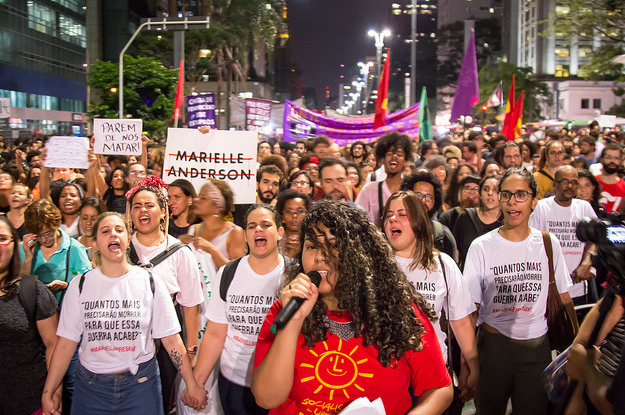“They tried to bury us, but didn’t realize we are seeds.” – Proverb cited at events marking the March 14 death of Rio de Janeiro city councilwoman Marielle Franco.
RIO DE JANEIRO – When Brazil abolished slavery in 1888, enslaved Africans comprised 40 percent of Rio de Janeiro’s population. Lacking rights in what was, and remains, one of the world’s most unequal countries for land ownership, newly freed slaves mostly settled into informal communities, favelas, which today shelter 24 percent of Rio’s population.
More than a century of public policy, often repressive and discriminatory by design, has kept the favelas and their residents from realizing their potential and from making full use of the assets they have developed in their communities.
Though the deck has been stacked against them, Rio’s favela residents have succeeded in weaving together a vibrant cultural and collaborative fabric over generations. This emerging, more positive favela identity has been made possible by a growing generation of local leaders who have taken on roles to organize themselves, improve their communities and confront often neglectful authorities.
Marielle Franco, a city councilwoman who on March 14 was shot and killed in what authorities say was a targeted assassination, was one of those leaders. A 38-year-old black LGBT woman and human rights defender from the Maré favela – in a country where a black youth dies every 21 minutes, a woman every other hour, an LGBT person once a day, and a human rights defender every five – Franco, more than anyone in Rio, represented hope for the city’s dispossessed.
But she was not alone. Indeed, if the public outcry in the days since Franco’s death has proved anything, it is that Rio’s favela residents won’t give up her fight to change the status quo.
Brazilian society is still in many ways based on the slave-holding social structure in place in its not-so-distant past. Favelas are offered little in the way of critical public services, like quality education. The elite do little to serve the favelas, the favelas do much to serve the elite. I once heard a member of the city government say that favelas were “convenient to have nearby” because they represented an offered source of cheap labor.
The Brazilian elite for decades has had little incentive to change that dynamic, and indeed the government continues to set up new roadblocks to the favelas’ development. A prime example is the pre-Olympic build-up from 2010-2016, when officials spent $20 billion on the city. Yet if anything the Games exacerbated inequality in Rio, with little to show in the city’s most marginalized communities. What’s more, using violence in the favelas, and their informality, as a pretext, officials evicted over 77,000 residents in the run-up to the Games. This was followed by a new pattern of development in which favela residents were carelessly forced hours away to federal public housing while some favelas gentrified.
But while the government invests little in local talent and potential in the favelas, the favelas do plenty to invest in themselves.
Franco was a rare elected representative among hundreds of networked and collaborative organizers in the favelas that have been maturing and consolidating their individual and collective missions. These groups are finding ever more space to express themselves and rewrite the narrative about their communities, often through avid social media use. They believe, like Franco did, that “the favela is not the problem. It is the solution.” The solution to affordable housing and marginalization, to neglect and repression. Communities built on resilience and resistance, as young leaders are increasingly reclaiming with pride the very term “favela,” apt given its origin in the robust, resilient and spiny favela bush, and given all these communities have accomplished through self-organizing.
These groups have only been further galvanized by Franco’s assassination. In Franco, they had a black favela woman behind the city council podium dealing directly with the problems they face on a daily basis, from police abuse to gender violence. For them, as for many others, she represented a future they are determined to see come to fruition.
Of course, that future will not arrive overnight. One of Franco’s final tweets read, “How many more will have to die for this war to end?” The same question was posed after her death on Wednesday. And two days later, the same question was being posed again, when a 1-year-old boy and a 58-year-old woman were shot by police in the Alemão favela, a community teeming with innovation and youth leadership.
One army colonel has argued publicly against the “martyrization of Marielle,” essentially ignoring the experience and sheer number of people who felt reflected in and represented by her. The truth is, something has fundamentally shifted in Rio’s consciousness.
Now, everyone knows Franco’s name. Now there’s a hunger to know who this woman was, what she stood for, what issues she was working on that would lead her killers to take such action. She has become a symbol and an inspiration, affirming the black, favela woman as a source of admiration and courage. Millions of seeds of insight and determination are being planted with every thought, feeling, sharing of her message, her beaming face and forceful presence. It is inevitable that Brazil will be transformed. The question is, how many more have to die?
—
Dr. Theresa Williamson is an urban planner who has been working with Rio’s favela communities since 2000. She is founder and executive director of Catalytic Communities (CatComm), an empowerment, communications, think tank, and advocacy NGO founded in 2000 in support of Rio’s favelas. She is also Editor-in-Chief of RioOnWatch, Rio’s bilingual favela reporting news site.





